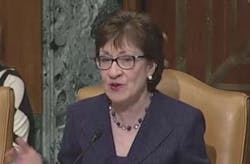The Senate Appropriations committee has approved a Department of Transportation budget bill that includes language to correct a potential problem with the 34-hour restart, but even with a clause to cap truck drivers’ hours highway safety groups are outraged about the trucking industry’s “backroom politicking.”
A 30-0 vote recommended the $56.5 billion FY2017 Transportation, Housing and Urban Development, and Related Agencies (THUD) Appropriations Act to the full Senate.
“Through considerable negotiation and compromise, this bipartisan bill makes important investments in our nation’s infrastructure, helps meet the housing needs of the most vulnerable among us, and provides funding for economic development projects that create jobs in our communities,” said Sen. Susan Collins (R-ME), chairman of the Senate Transportation, Housing and Urban Development Appropriations Subcommittee. “This legislation assists families in need, funds grants to help reduce homelessness, increases the safety of our nation’s highways and airspace, and supports transportation infrastructure and community development projects that will help grow our economy.”
In the appropriations package two years ago, Collins included language that initially rolled back the restart provisions on hours of service limits, pending further study of 2013 changes by Federal Motor Carrier Safety Administration.
But the current budget appropriation, passed by Congress in December, contains an apparent legislative error in a clause meant to preserve the restart status quo until the study is complete. DOT, however, determined later that a loophole in that language could eliminate the restart altogether.
So, as expected, the funding bill for the 2017 fiscal year contains a correction. Specifically, if the study shows that the 2013 restart changes have resulted in “demonstrated statistically significant improvement” in highway safety and driver health, then those changes—which included two consecutive overnight off-duty periods—would be reinstated.
However, if the study does not support the 2013 restart changes, then the previous restart rules would be restored with this addition: “A driver who uses that restart rule may not drive after being on duty more than 73 hours in any period of 7 consecutive days.”
Safety groups and their supporters in the Senate had argued that the pre-2013 rule allowed truck drivers to work for 80 hours or more in a week, but the 73-hour clause hasn’t eased their concerns.
Indeed, the “markup” of the THUD bill lacked any actual “marking up”—or any discussion or debate of provision, suggested Cathy Chase, vice president of governmental affairs, Advocates for Highway and Auto Safety. The committee ignored “compelling facts” about driver fatigue and highway deaths, and put corporate trucking interests before the safety of American motorists, according to the Adovcates statement.
“This closed door backroom politicking is a prime example of why the American public distrusts the process,” Chase said. “Unfortunately, the change made to the HOS Rule does nothing to address the serious problem of cumulative fatigue.”
Similarly, Daphne Izer, founder of Parents Against Tired Truckers, called the committee’s actions “an egregious exploitation" of the appropriations process.
“For a third year now, the Senate Appropriations Committee has passed a spending bill that was co-authored by a select few trucking industry lobbyists,” Izer said. “The industry-penned provision will increase the amount of hours truck drivers can work in a week and deprive truckers of a real weekend off. This is wrong on so many levels.”
In addition to a vote before the Senate, the House also will develop a version of the DOT funding plan.




